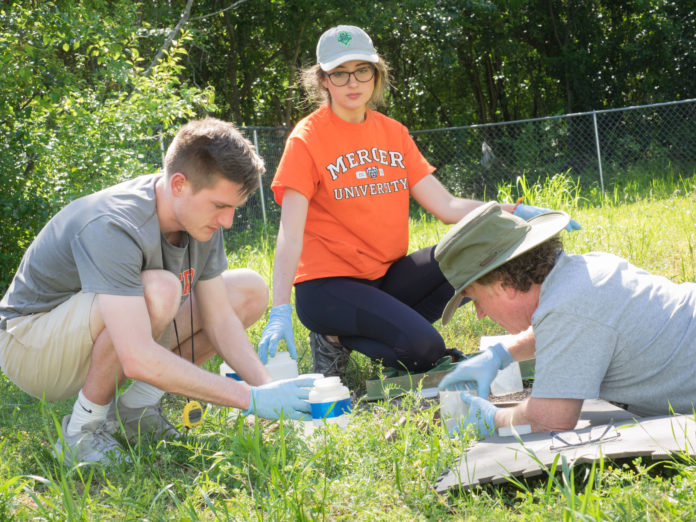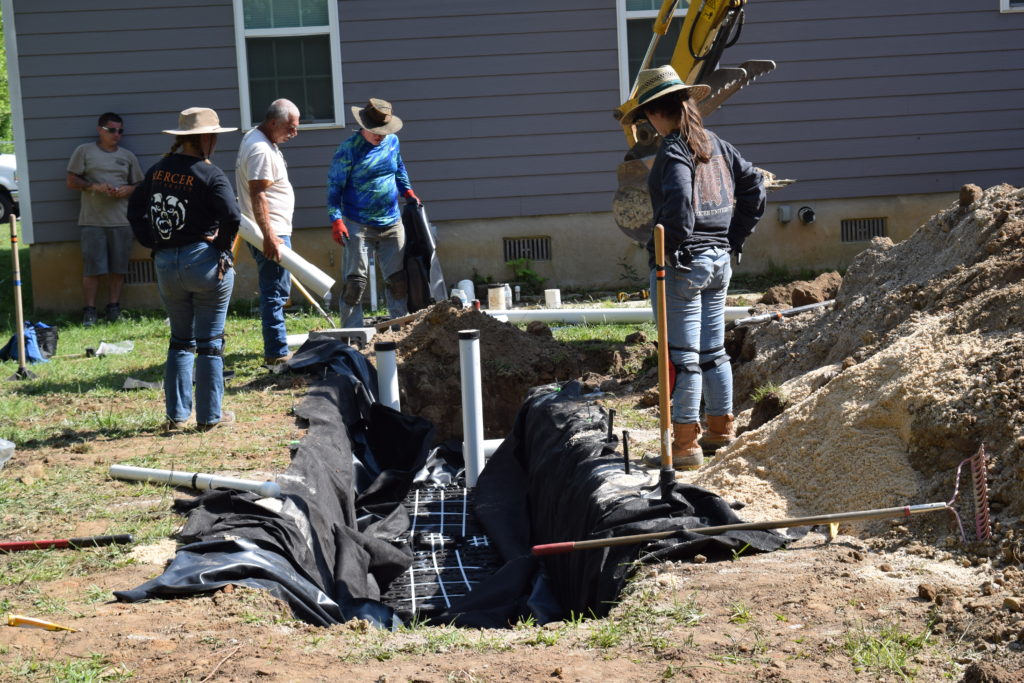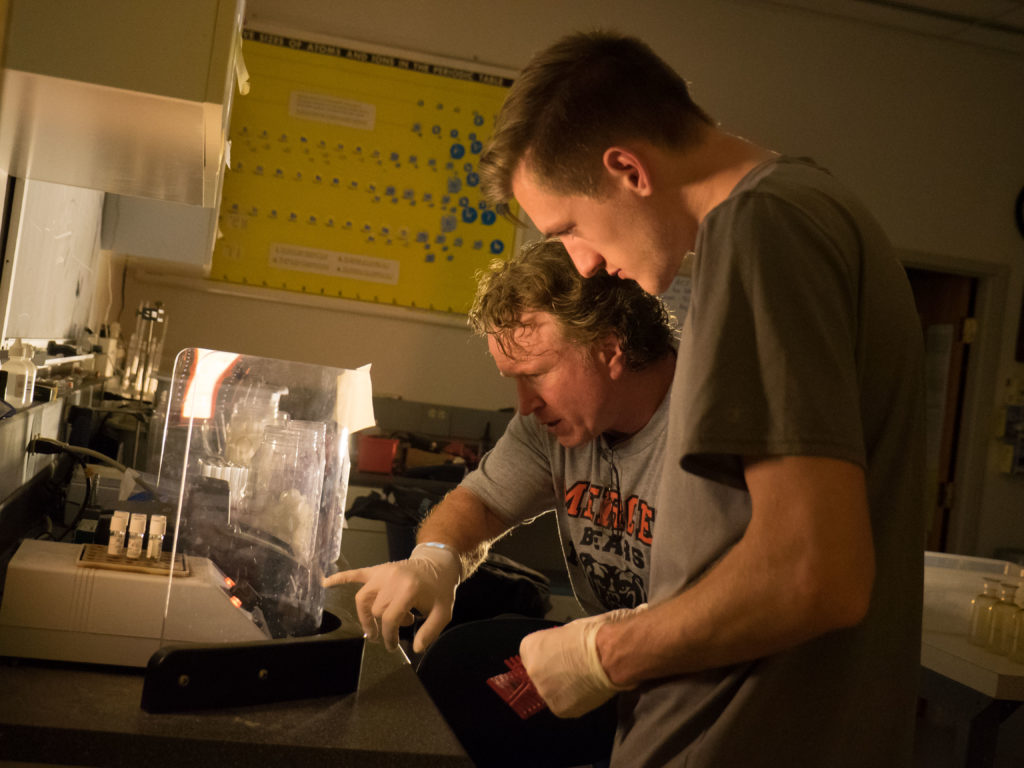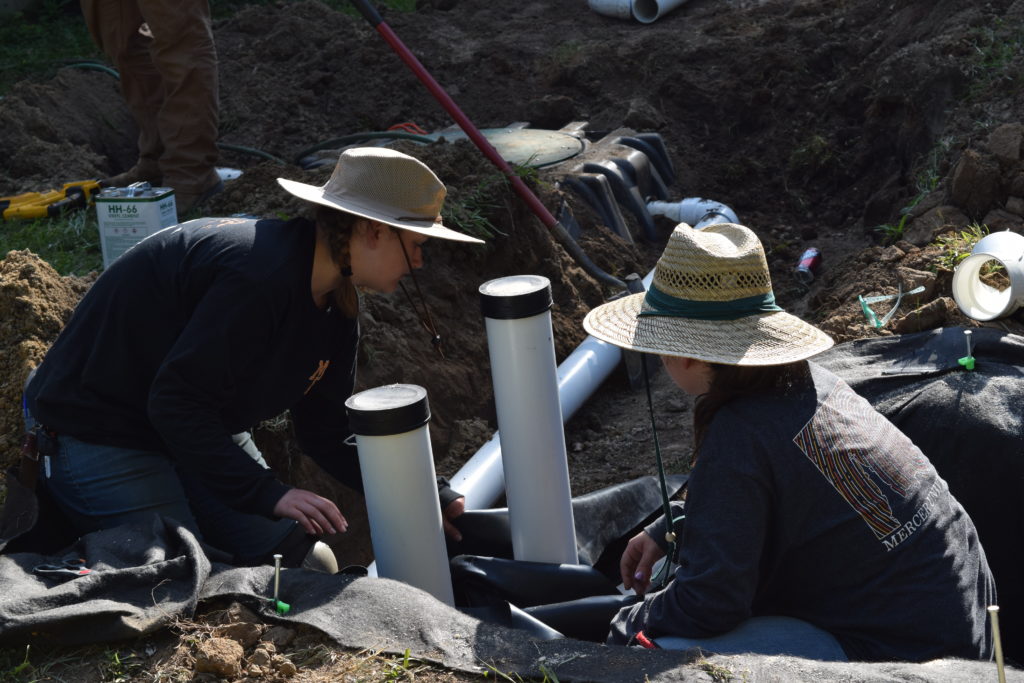
For nearly two decades, a Mercer University professor and his students have been finding ways to use water more efficiently. Gray water research led by Dr. Philip McCreanor, environmental engineering professor and director of the Engineering Honors Program, has resulted in the installation of water treatment systems at some Macon Area Habitat for Humanity houses. Students continue to be involved in monitoring these systems and studying other potential advancements.
Gray water is wastewater that comes from bathroom sinks, showers, baths and washing machines, and it can be treated through on-site systems and reused for other purposes like yard irrigation, Dr. McCreanor said. Toilet water (also known as black water) and, in most states, wastewater from kitchen sinks and dishwashers are excluded from the gray water category and cannot be recycled on-site.
All the water that flows from household appliances and fixtures goes through the same treatment process at local wastewater treatment plants. When gray water is reused, it reduces water usage and water bills as well as the burden on both potable and wastewater treatment plants
“Developing alternative technologies to try to reduce the load on wastewater infrastructure is really important,” said senior Dalton Everhardt, an environmental engineering major who has been working with Dr. McCreanor since his freshman year. “In the U.S., we use drinkable quality water for everything we do. The idea that we put that much effort into water that we aren’t drinking doesn’t really make sense. One of the biggest culprits is using drinkable water in the yard.”
Dr. McCreanor and his students have designed systems that use gray water for yard irrigation, and it all started with a senior design project in 2002. A team of engineering students, including 2003 environmental engineering graduate Kate Kubesheski, designed and installed a residential gray water treatment system.
“Gray water systems can provide water where you need it without using potable (drinking quality) water,” said Kubesheski, who is now director of Wastewater Operations for Macon Water Authority. “We’re not in a drought situation like some parts of the country, but there are limited supplies of freshwater. When you can supplement what you’re doing with gray water, that’s a good opportunity to take.”

That senior design project was followed by lab work by Dr. McCreanor’s senior environmental engineering class in partnership with Harold Tessendorf, former executive director of Macon Area Habitat for Humanity.
“(Tessendorf) saw a natural win-win for us as far as using these systems at Macon Area Habitat for Humanity homes,” McCreanor said. “You’d be able to do a real simulation and evaluation. It would make the yards at the Habitat homes look nice because it would automatically irrigate and wouldn’t have a cost to the homeowner, and it would give me an opportunity to do research on gray water.”
They installed above-ground detention and filtration systems in two Habitat for Humanity homes, the first funded by a SEED grant from Mercer’s Provost Office in 2009 and the second by a State Farm service-learning grant in 2013. The purpose of these early systems wasn’t to actively treat gray water but to allow the team to study how it’s produced and the volume of it. Those two sites also demonstrated how the systems measured up when it came to meeting two main regulations: total suspended solids and biochemical oxygen demand (BOD5).
Senior capstone labs, independent research projects and Mercer Summer Engineering Experiences were devoted to studying intermittent sand filters to treat that BOD5 level. A Research That Reach Out grant allowed for the installation of an in-ground gray water treatment system — consisting of a settling tank and an attached growth biological treatment unit — at a new Habitat home in 2016.
Then, through funding from the EPA’s People, Prosperity and Planet (P3) student research grant program, Dr. McCreanor and his team upgraded the system at one of the initial Habitat homes using lighter-weight materials and new bio-filtration technology in 2019. These two gray water treatment systems are still active and automatically irrigate the homeowners’ yards, Dr. McCreanor said.
Dozens of students have been involved in gray water research with Dr. McCreanor over the years. They continue to monitor the two active Habitat systems monthly, collecting samples at the sites and testing them back at the Mercer lab. This year, senior design students are looking into ways that black water could be treated.
“It’s exciting, and it’s challenging, but it’s real world,” Dr. McCreanor said. “As soon as you can get students involved hands on, it brings their education to life. Doing experiments (in the lab) is different than going out in the field and seeing how it all comes together and how it works.”

That real-world experience creates better engineers, and it gives students the opportunity to present research at conferences and improves their resumes, he said.
“There are processes of water that I’ve learned in class, but I never really understood them until I got out into the field and did it,” said senior Nicholas Sun, an environmental engineering major who regularly assists with the gray water sample collection and processing. “It’s really nice to do it because it gives me lab experience, and I have a really great mentor in Dr. McCreanor.”
Victoria Rexhausen, a May 2018 environmental engineering graduate who is now pursuing a Ph.D. at the University of Tennessee, Knoxville, did gray water research for her engineering honors project and led the submission of the EPA grant. She and the grant team were able to present their findings at a student-design expo in Washington, D.C., which was one of her favorite memories from Mercer. Rexhausen said her experiences made her want to have a career in research and pursue a Ph.D.
“I’m passionate about sustainability, and this had a great sustainability application for water conservation,” she said. “Mercer does a really amazing job at getting scientific advancements and knowledge into a place where it’s interacting with the community. It’s great to see something that is totally applied toward improving people’s lives and having a more sustainable impact. It was really inspiring to me.”
Everhardt helped with the deconstruction of the second Habitat gray water treatment system and has done regular monitoring and sample collection of the remaining systems. He said the work with Dr. McCreanor led him to participate in two water-quality-related summer research programs with the University of Nebraska-Lincoln.
He’s currently working on publishing a research paper about the gray water advancements over the past two years. In addition, he and Sun have presented their research for Mercer’s BEAR Day and the Sigma Xi student poster competition.
“It’s been a lot of fun, and it’s helped open my eyes to a lot of issues,” Everhardt said. “Overall, it’s just been a great experience. I’ve become not only a better researcher but a more well-rounded person by my involvement.”










